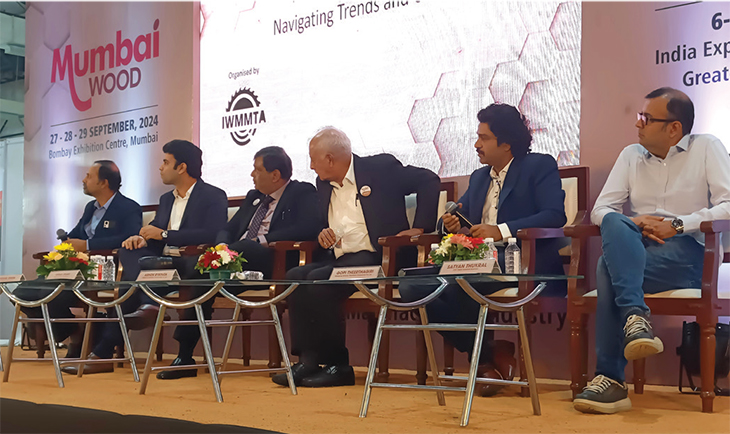‘Collaboration holds the key to success’
IWMMTA takes stock of furniture manufacturing scenario in India

The Indian woodworking industry is undergoing significant transformations, marked by advancements in machinery and technology, evolving consumer demands, and increasing global competition.
At the recent panel discussion of the Indian Woodworking Machinery Manufacturers’ and Traders’ Association (IWMMTA), industry leaders came together to address the challenges and opportunities facing the sector and how innovation, collaboration and technology are reshaping the future.
The panel began with Ashok Dsouza reflecting on IWMMTA’s original vision of uniting machinery manufacturers and fostering collaboration across the value chain. Over the years, IWMMTA’s role has evolved significantly, promoting advancements in woodworking technology and raising industry standards in India.
Gopi from Woodtech shared data on the size of the Indian furniture industry, estimating it to be worth billions and growing rapidly due to increasing demand for both residential and commercial furniture. He highlighted that this demand is fuelling the growth of the woodworking machinery sector, particularly in areas like automation and precision manufacturing.
He emphasised how technological advancements, such as CNC (computer numerical control) machines, have revolutionised the industry by increasing productivity and reducing human error. Gopi credited IWMMTA with playing a pivotal
role in promoting these advancements and facilitating knowledge exchange among furniture manufacturers.
Nirav Shah of Jai Industries pointed out that furniture design trends, including modular and space-saving ones, are influencing machinery innovations. “Machines are now being developed to cater to the unique requirements of these trends, enabling faster production without compromising on customisation or quality,” he said.
Automation has become a crucial factor for both machinery manufacturers and furniture producers, according to Satyan Thukral from Caple Industrial Solutions. He discussed how automation allows manufacturers to meet the increasing demand for faster, more precise production.
“This is particularly important in the era of mass customisation, where customers expect personalised products without extended lead times. Automation helps balance customisation with the efficiency of scale, bridging the gap between bespoke craftsmanship and mass production,” he said.
On the topic of global competitiveness, Prahallada from Biesse India noted that while Indian manufacturers are making rapid strides, there is still a long way to go. “To compete on the global stage, Indian companies must continue to innovate and invest in cutting-edge technologies,” he felt.
Mayank Singh of Felder India highlighted several promising innovations that will shape the future of both woodworking machinery and furniture manufacturing. Among these are advancements in artificial intelligence and machine learning to further enhance automation capabilities, and developments in 3D printing to revolutionise the way furniture is produced.
The panel also addressed two significant challenges facing the industry: the shortage of skilled manpower and the risks associated with technological advancements. Satyan pointed out that as machines become more sophisticated, the need for skilled operators and technicians has increased.
On the risks facing the woodworking machinery and furniture sectors, Prahallada highlighted several, including economic downturns, changes in consumer preferences, and the rapid pace of technological change.
To future-proof their businesses, he advised furniture manufacturers to stay agile and adaptable, continually upgrading their machinery and processes to remain competitive.
The discussion concluded with an emphasis on the importance of maintenance and lifecycle management of machinery. Mayank stressed that regular maintenance is critical to the success of furniture manufacturers, as well-maintained machines reduce downtime and ensure consistent quality.
“Many companies are now investing in predictive maintenance technologies to optimise the lifespan of their machinery and improve overall operational efficiency,” he noted.
“As the sector continues to evolve, driven by innovation and changing market demands, collaboration between machinery manufacturers and furniture producers will be crucial to maintaining competitiveness. The IWMMTA will play an essential role in fostering this collaboration,” Ashok concluded.
Comments

- ‘Red gazelle’ makes window installation easy
- Felder’s solutions for window and door production
- Versatile sliding-folding systems from Hafele
- Door line automation from Woodtech Consultants
- Accutec solutions for uPVC windows
- Jowat’s VOC-free primer for window profile wrapping
- Flexible solutions for doors, windows from SCM
- Tostem introduces Giesta steel doors; calls for dealers
- Folder system by Salice optimises cabinet space
- Turakhia has top-quality veneers for doors
- Mirka has solutions for difficult sanding of doors
- When Lamello’s Cabineo became a game changer
- Digital lacquer embossing for flooring from Hymmen
- Weber sanders help achieve luxury surfaces
- Rehau has designs on growing edge band market
- Samet ties up with Greenply to tap Indian hardware market
- IMA Schelling sets up base in India
- Hettich earns BIS nod for hinges, runners
- Biesse India now a Multi-Material Expert
- The importance of selecting the correct tools
- Indian cabinet maker shines at Lyon WorldSkills
- ‘Collaboration holds the key to success’
- Fibreboard recycling becomes a reality
- MumbaiWood now a recognised destination
- Knock on wood: A bouquet of training courses!
- Ligna 2025: ‘Thinking in circles’
- CIFF-Shanghai focuses on furniture design
- Felder hosts in-house show, Technology Days
- Interzum Forum Italy makes impressive debut
- Koelnmesse ties up for 3-in-1 Jakarta fair
- WOFX: a global hub for innovation and growth
- Events Calendar: industry fairs you must visit
- 3D is printing sustainable housing solutions
- Hard or soft? Researchers discover new wood type
- Master, apprentices take AHEC’s cherry challenge
- ‘Zero-to-launch’ modularity transforming hospitality
- ICA’s Urban Matter is about satin-finish metal effect
- MTC’s ‘Woven timbers’ create waves
- Impact of material in interior design
- Underestimated danger: Sharp edges
- Playing safe on clothing storage units
- ‘Green’, 3D-printed panel floors it!
- Adhesive-free joining of wood, metal
- Energy-efficient manufacturing of fibre-based products
- Rice bran wax: a sustainable alternative
- Dual-side hand sanding block has unique features
- Bio-based products for sustainable development
- ‘Wood Vaulting’ may enhance CO2 sequestration
- Protecting forests through advanced AI
- Forest certification benefits wildlife too!
- Elizure, the Rolls Royce of laminates!
- Rehau unveils new Rauvisio Riviera collection
- Hawa Concepta III: upgrade to seamless functional doors
- Hafele’s RE-Twist locks in on security
- Optimus machines feature tomorrow’s technology today
- Merino unveils cutting-edge offerings
- Ornare launches new premium laminates
- New nesting models from SCM
- Advanced moulder, membrane press from Woodtech
- Greenlam Laminates unveils exclusive display centre in Pune
- EUDR implementation dates may be deferred
- Herman Miller introduces bamboo upholstery
- Altendorf named ‘Brand of the Century’
- Catas to verify its test reports
- Combilift wins two prestigious awards
- Holz-Her management transition
- Replica of the Oval Office opens
- Ozone Blu sets up experience centre
- SCM opens new subsidiary in Slovenia
- VDMA faces business stagnation
- RentoMojo reports strong growth in FY24
- Century Plyboards on expansion mode
- Subhra named DG of FSC
- Meta to assist Skill India Mission
- Sugatsune opens Bengaluru experience centre
- Dieffenbacher acquires Pagnoni
- Pepperfry partners with Infra.Market
- Hafele opens light store in Chandigarh









































